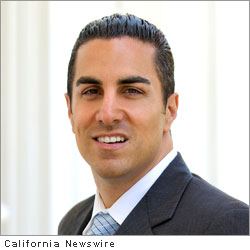SACRAMENTO, Calif. /California Newswire/ — The University of California system is overcrowded, with slots increasingly scarce for California’s growing population. California industries, from animation to aviation to app-design, are finding it difficult to find the specialized graduates they need, says Assemblyman Mike Gatto (D-Glendale). To solve these two problems, Gatto introduced AB 1483, legislation that will start the process for the creation of a new University of California campus.
 The Assembly Higher Education Committee voted 8-4 to approve Assemblyman Gatto’s legislation to create a new UC campus in order to provide extra capacity and to promote STEAM subjects (Science, Technology, Engineering, Arts, and Mathematics).
The Assembly Higher Education Committee voted 8-4 to approve Assemblyman Gatto’s legislation to create a new UC campus in order to provide extra capacity and to promote STEAM subjects (Science, Technology, Engineering, Arts, and Mathematics).
“Each year, Berkeley and UCLA reject thousands of students with GPAs over 4.0, many of whom are valedictorians, because of a lack of capacity,” explained Assemblyman Gatto, writing in the Los Angeles Times last month. “Many students end up paying more to attend comparably ranked private or out-of-state schools. This exodus of motivated, intelligent students — many of whom settle out of state — isn’t good for California in the long run.”
Gatto’s legislation would start the process of creating a new UC with a study on the feasibility of creating such a campus. It also appropriates $50 million for land acquisition and initial building costs for the future “UC-Tech” campus, once the UC Regents have determined the ideal location. This new campus would provide an elite technical education comparable to Caltech. However, with Caltech’s base tuition at $43,000 a year (compared to the $13,000 base tuition for in-state students at UC’s), this elite public education would save California students at least $120,000 over the course of a four-year degree.
In a 2013 interview with code.org, Mark Zuckerberg, of Facebook, explained that, “Our policy at Facebook is literally to hire as many talented engineers as we can find. There just aren’t enough people who are trained and have these skills today.” Virgin Founder and CEO, Richard Branson, expressed similar concerns when he stated that, “Whether we’re fighting climate change or going to space, everything is moved forward by computers, and we don’t have enough people who can code.” Their observations are supported by a 2012 U.S. Citizenship and Immigration Services report which showed that 85,000 H-1B visas were issued to foreigners with specialized technical education whose skills were required for jobs in the United States. Seventy-two percent of H-1B holders were between the ages of 25 and 34.
Education and political leaders from across the state, including UC President Janet Napolitano and Governor Jerry Brown have also expressed concerns about the lack of capacity in the UC system. The UC Master Plan, written in 1960, promised that all California students who finished in the top one-eighth (12.5%) of their class could access a state-run university for free. Yet as Governor Brown recently noted, demand has resulted in California’s flagship university – the University of California at Berkeley – closing its doors to “normal” people. These challenges are likely to get worse as time goes on. In 2050, California is projected to have almost 50 million residents, or 13.6 million more than in 2005, when the last UC was opened. Even affirmative-action proponents have acknowledged that much of the controversy can be resolved with additional higher-education capacity.
Specialization within California’s public higher-education system is not new. UC Hastings College of the Law is the United States’ only public, stand-alone law school, and UCSF is dedicated solely to graduate education in health and biomedical sciences. By creating a UC school with a focus on STEAM subjects, AB 1483 would help fill the needs of companies looking for employees who are both creative and technologically savvy, including companies that create software and video games, make movies, and render three-dimensional engineering models.
“Many of the problems within the UC system can be solved with increased capacity,” said Gatto. “It only makes sense to create that capacity in the practical subject areas that generate the best-paying jobs.”
Mike Gatto is the Chairman of the Consumer Protection and Privacy Committee, and currently the longest-serving member in the State Assembly. He represents California’s 43rd Assembly District, which includes Burbank, Glendale, La Cañada Flintridge, La Crescenta, Montrose, and the Los Angeles neighborhoods of Atwater Village, East Hollywood, Franklin Hills, Hollywood Hills, Los Feliz, and Silver Lake. www.asm.ca.gov/gatto














